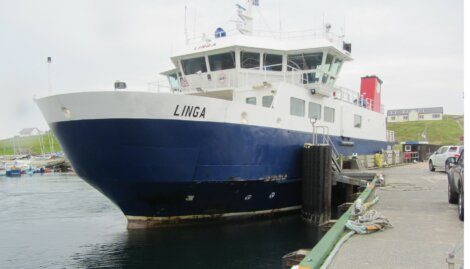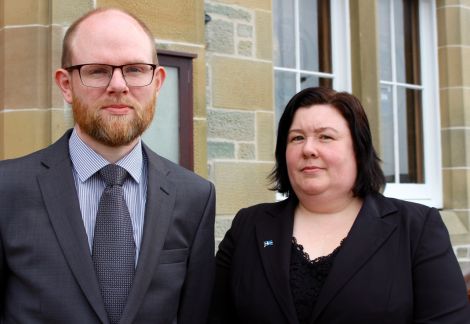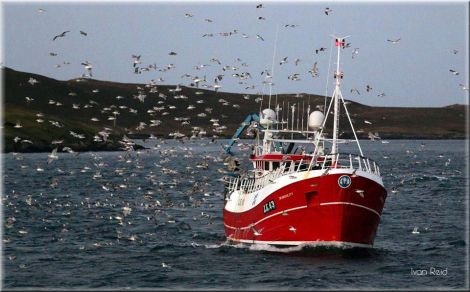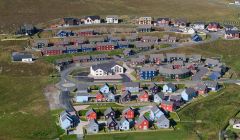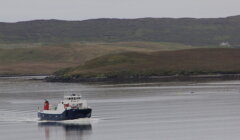Who stands for the Council? / Fair ferry funding deal shows councillors ‘can truly make a difference’
Leadership needed to ensure community’s voice is heard loud and clear by government
The “Who stands for the council? It’s people like you” campaign aims to encourage more candidates to come forward for May’s elections to Shetland Islands Council. In the fifth and final part of a series of features looking at some of the main issues the local authority is working on, through its corporate plan Our Ambition 2021-26, SIC leader Steven Coutts and deputy leader Emma MacDonald share their experience of making the case for both the council and key local industries to government ministers.
ONE OF the most significant achievements Shetland Islands Council has made recently was securing millions of pounds in the form of “fair ferry funding” that councillors, officials and campaigners alike had been calling on the government to provide for many years.
Following years of frustration engagement by senior councillors and officials paid off last year, delivering an extra £10.8 million a year that would otherwise have had to come from cuts to services elsewhere. The sum amounts to almost a tenth of the total funding the SIC receives from Holyrood annually.
It highlighted the importance of councillors engaging and making Shetland’s voice heard loud and clear in political forums outwith the islands – and not just when it comes to securing direct funding.
SIC leader Steven Coutts said: “In terms of being democratically elected, we’re close to the people and in a position to know the community best, and it’s about relaying that to other decision makers.
“With fair ferry funding, if there weren’t councillors involved that wouldn’t have been achieved. It’s more than £10 million into our budget, which is significant. It goes to show that you can truly make a difference.”
The islands are at a crossroad as the energy economy transitions from oil and gas to renewables, and how that is done will be crucial for the community’s wellbeing.
“We want it to be a positive transition, because otherwise these changes happening around our community could have a really detrimental effect on Shetland,” Coutts explained.
“We need to ensure that any decisions that are made in a way that is not counterproductive from an environmental, social or economic perspective.”
Alongside the ORION project – aimed at transforming Shetland into a centre for secure and affordable clean energy – the signing of an historic “Islands Deal” in March 2021 will be pivotal in securing the investment in industry needed in the remainder of this decade.
It incorporates £100 million of investment in Shetland, Orkney and the Western Isles – £50 million apiece from the UK and Scottish governments – with a further anticipated investment of some £235 million from project partners to help create jobs and tackle depopulation across the three Scottish island groups.
Coutts said: “It’s the highest per capita agreement of its kind in the UK and the Islands Deal demonstrates the success of our engagement, alongside Orkney and Western Isles councils, in getting governments to recognise the opportunities that exist around Shetland and the other islands.”
The council also cites a draft hydrogen plan drawn up by the Scottish Government last year. Opportunities at Sullom Voe are clearly articulated within the plan, as is the need to address barriers to producing hydrogen on an industrial scale, and again that is thanks to engagement from councillors and officials with the report’s authors.
Coutts said travelling away to see other parts of the country had been beneficial in helping him “recognise what we’ve got here in Shetland”.
Securing ferry funding and investment in key capital projects such as new schools showed the importance of taking a “collaborative approach” and reflecting on how your message will “land with the person or organisation you’re directing it at”.
“You do need to hold councillors and governments to account, don’t get me wrong – they’ll be told where they’re going wrong and they should be – but don’t just start from a position of confrontation. There needs to be real attention paid to influence and persuasion and building of strong cases,” Coutts said.
‘The voice of Shetland needs to be heard in negotiations’
Councillors have a key role to play both in pursuing funding for the local authority directly and in telling the wider community’s story.
In addition to finding ways to maintain and replace important oil and gas jobs – and ensuring there are ways for those skills to be transferred to a new set of industries – arguing the case for Shetland’s traditional industries remains vital.
The fishing industry accounts for 16 per cent of all Scottish landings, including a quarter of all pelagic fish, while the seafood sector provides some four fifths of the country’s production of mussels.
In the wake of Brexit, making that industry’s presence felt as new deals are hammered out has never been more important.
Coutts said: “The way Shetland contributes to the fishing and aquaculture industry means the voice of Shetland needs be heard in negotiations moving ahead.
“Speaking to government ministers and officials, we have to keep reminding them that there’s more fish landed here than in England, Northern Ireland and Wales put together – we need to keep highlighting the industry’s importance to our community.”
Deputy leader Emma MacDonald, meanwhile, feels that engaging constructively within the council is the way forward for new elected members. The SIC’s corporate plan and its goals and objectives were unanimously approved by all 22 councillors – reflecting how “every member has a voice and can influence”.
“I first joined four and a half years ago and I didn’t feel because I didn’t have a certain position that my voice wasn’t recognised,” she said. “You were part of something and could still influence debates and make a real contribution.
“I think it is important to engage in the process in a positive manner. I wanted to learn, wanted to do a good job and that means making the best use of the training and seminars to get a good level of understanding. Even as a single member coming in you can make a difference, and it’s better if you come in with a positive attitude wanting to work with people.”
Interested in standing to be a councillor this May? Find out more via the elections section on the SIC’s website.
Become a member of Shetland News
Shetland News is asking its readers to consider paying for membership to get additional perks:
- Removal of third-party ads;
- Bookmark posts to read later;
- Exclusive curated weekly newsletter;
- Hide membership messages;
- Comments open for discussion.
If you appreciate what we do and feel strongly about impartial local journalism, then please become a member of Shetland News by either making a single payment, or setting up a monthly, quarterly or yearly subscription.

